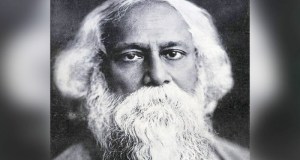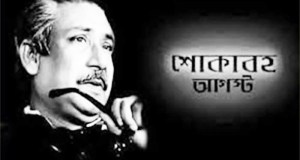MNA Feature Desk: The nation celebrates the birth centenary of the Father of the Nation Bangabandhu Sheikh Mujibur Rahman today.
The mega celebration programme earlier taken has been restructured in the wake of coronavirus outbreak in the country. However, the year long celebration programmes will continue during the ‘Mujib Year’ that ends on March 17, 2021.
President and Prime Minister have issued messages on the occasion.
The countdown for the celebration that started on January 10 concludes today.
The newspapers came up with special supplements to mark the day. The electronic media will also air special programmes on the day.
The day will also be observed as National Children’s Day.
Bangabandhu nurtured the dream of achieving an exploitation- free society for the people of the green delta and worked with utmost dedication to carve out an independent nation for them.
The dream takes a definite shape around 3:15pm on March 7 in 1971, when the Superman entered the stage at Ramna Race Course Maidan..dressed in a white panjabi and pajama with the characteristic black waistcoat. As he walked on to the stage the crowd welcomed him chanting full-throated slogan Joy Bangla. It was Bangabandhu Sheikh Mujibur Rahman, the tallest man among the tall.
On this day in 1920, Bangabandhu, the great Bengali poet of politics, vivacious leader of the Bengali nation and the architect of the independent Bangladesh was born in a respected Muslim family at Tungipara village of Gopalganj sub-division, now a district.
He was the third among four daughters and two sons of his parents – Sheikh Lutfur Rahman and Saira Khatun. Sheikh Mujib
The greatest Bengali of all times an undisputed leader of the Bengali nation, chief of the Awami League and majority leader in Pakistan national assembly presented us the identity as ‘Bengali’ a new Nation in the world.
Mujib started to show his colour and race, the potentials of leadership since his school life. His parents noted in an interview that at a young age, he organized a student protest in his school for the removal of an inept principal. Mujib withdrew from school in 1934 to undergo eye surgery, and returned to school only after four years, owing to the seriousness of the surgery and slow recovery.
While a student of Gopalganj Missionary School, AK Fazlul Huq, the then Chief Minister of Bengal, came to visit the school (1938). The young Mujib is said to have organized an agitation in order to impress the chief minister about the depressed situation of the region. While a student in Islamia College he was elected general secretary of the College Students Union in 1946. He was an activist of the Bengal Provincial Muslim League and a member of the All India Muslim League Council from 1943 onwards.
Bangabandhu loved Bengali and Bangladesh like anything, When he returned home on January 10 in 1972 and took the charge of reconstructing the war-torn country he said, “From now on the name of the Birangana’s father would be Sheikh Mujibur Rahman and exactly the war child’s father’s name would be the same.”
Sheikh Mujib was one of the first among the language movement detainees (March 11,1948). His address on September 21, 1955 in the Pakistan Constituent Assembly on the question of Bangla language is noteworthy.
Claiming the right to speak in his mother tongue, Sheikh Mujibur Rahman said, “We want to speak in Bengali here, whether we know any other language or not it matters little for us. If we feel that we can express ourselves in Bengali we will speak always in Bengali even though we can speak in English also. If that is not allowed, we will leave the House, but Bengali should be allowed in this house, that is our stand.”
As an activist he had been a supporter of the Suhrawardhy-Hashim faction of the Muslim League. During the 1946 general elections, the Muslim League selected him for electioneering in Faridpur district.
Sheikh Mujibur Rahman was one of the principal organisers behind the formation of the East Pakistan Muslim Students League (est. 1948). After partition (1947), he got himself admitted into the University of Dhaka to study law but was unable to complete it, because, he was expelled from the University in early 1949 on charge of “inciting the fourth-class employees” in their agitation against the University’s indifference towards their legitimate demands.
Sheikh Mujib’s active political career began with his election to one of the posts of joint secretaries of the East Pakistan Awami Muslim League (1949). As a political prisoner, he was then interned in Faridpur jail. In 1953, Sheikh Mujib was elected general secretary of the East Pakistan Awami Muslim League, a post that he held until 1966 when he became president of the party.
Like his political mentor Huseyn Shaheed Suhrawardy, Mujib also underscored the importance of party organisation and management. To organise the party, he resigned from the Cabinet of Ataur Rahman Khan (1956-58) and devoted himself to the task of taking the party to grassroots level.
A charismatic organiser, Sheikh Mujib had established his firm control over the party. He had the mettle to revive the Awami League in spite of the fact that his political guru, HS Suhrawardy, was in favour of keeping political parties defunct and work under the political amalgam called National Democratic Front.
Sheikh Mujibur Rahman entered parliamentary politics first in 1954 through his election as a member of the East Bengal Legislative Assembly on the United Front ticket. He was also a member of the Pakistan Second Constituent Assembly-cum-Legislature (1955-1958).
Sheikh Mujib was a pragmatic politician. In the Pakistan state, he appeared as the undaunted advocate of the Bengali interests from the start. He was among the first language prisoners. However, Sheikh Mujibur Rahman grew in political eminence in the early 1960s.
Through his organising ability Mujib was able to salvage the Awami League from a series of defections and exit of various factions from the mainstream party. He reorganised the Awami League and put it on a firm foundation. In 1966, he announced his famous six-point programme, calling it ‘Our [Bengalis’] Charter of Survival.’
Disturbed by the political views of Sheikh Mujib, the Ayub regime put him behind bars. A sedition case, known as Agartala Conspiracy Case, was brought against him. It may be noted that during most of the period of the Ayub regime, he was in jail, first from 1958 to 1961 and then from 1966 to early 1969. In early 1969 and Ayub administration was compelled to release him on February 22 ,1969 unconditionally.
On the following day of his release, the Sarbadaliya Chhatra Sangram Parishad (All Parties Students Action Committee) organised a mass reception to him at Ramna Racecourse (now, Suhrawardy Uddyan) and accorded him the title ‘Bangabandhu’ (Friend of the Bengalis).
In him they saw a true leader who suffered jail terms for about twelve years during the 23 years of Pakistani rule. Twelve years in jail and ten years under close surveillance, Pakistan, to Sheikh Mujib, indeed proved to be more a prison than a free homeland.
The general elections of December 1970 made Bangabandhu Sheikh Mujibur Rahman the sole spokesman of East Pakistan. The people gave him the absolute mandate in favour of his six-point doctrine. Bangabandhu’s most uncompromising stand on the six-point programme led ZA Bhutto and Yahya’s military junta to take a stringent view.
Instead of allowing him to form the government, the junta resolved to undo the results of the elections. President Yahya Khan cancelled unilaterally the National Assembly meet Dhaka scheduled to be held on March 3, 1971. The announcement triggered off the death-knell of Pakistan. Bangabandhu called an all-out non-cooperation movement in East Pakistan.
During this time, on March 7 Mujib made a historic address at a mammoth gathering at the Race Course at the end of his speech, he made a clarion call, saying: “Build forts in each homestead. You must resist the Pakistani enemy with whatever you have in hand.
Remember, we have given a lot of blood, a lot more blood we shall give if need be, but we shall liberate the people of this country, Insha Allah (God willing). The struggle this time is the struggle for our emancipation, the struggle this time is the struggle for independence.”
Meanwhile, General Yahya Khan and other leaders from West Pakistan came to Dhaka on March 15 to start a dialogue with Bangabandhu Sheikh Mujib and his party. The dialogue began on the following day and continued intermittently down to March 25 morning.
At mid-night of March 25, 1971, the Pakistan army launched its brutal crackdown in Dhaka. Sheikh Mujib was arrested and kept confined at Dhaka Cantonment until he was airlifted to West Pakistan for facing trial for sedition and inciting insurrection.
Throughout the period of the War of Liberation, Sheikh Mujib’s charisma worked as the source of national unity and strength. After the liberation of Bangladesh on December 16, 1971 from Pakistani occupation, Sheikh Mujibur Rahman was released from Pakistan jail and via London arrived in Dhaka on January 10, 1972.
Bangabandhu Sheikh Mujibur Rahman headed the first government of the post-liberation Bangladesh for a period of three years and a half. Starting from scratch his government had to deal with the countless problems of a war ravaged country.
Restoring law and order, rehabilitating the Mukhtijodhas (Freedom Fighters), restoring the ruptured communication system, and, most importantly, feeding the hungry millions and many other problems bedeviled his administration. Because of his charismatic leadership Bangladesh gained recognition from the international community including the United Nations.
Bangabandhu Sheikh Mujibur Rahman was assassinated by a group of disgruntled army officers on August 15, 1975 along with most of his family members excepting for his two daughters who had been staying abroad at that time.
 Mohammadi News Agency News – Features – Photo
Mohammadi News Agency News – Features – Photo






